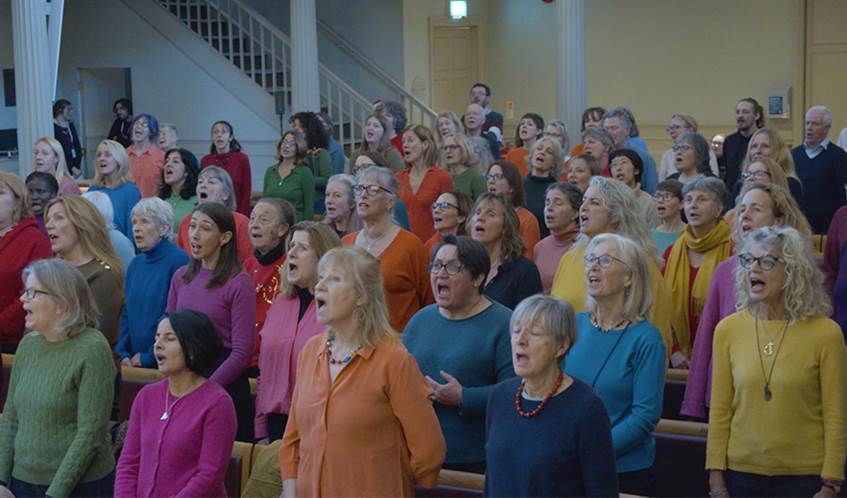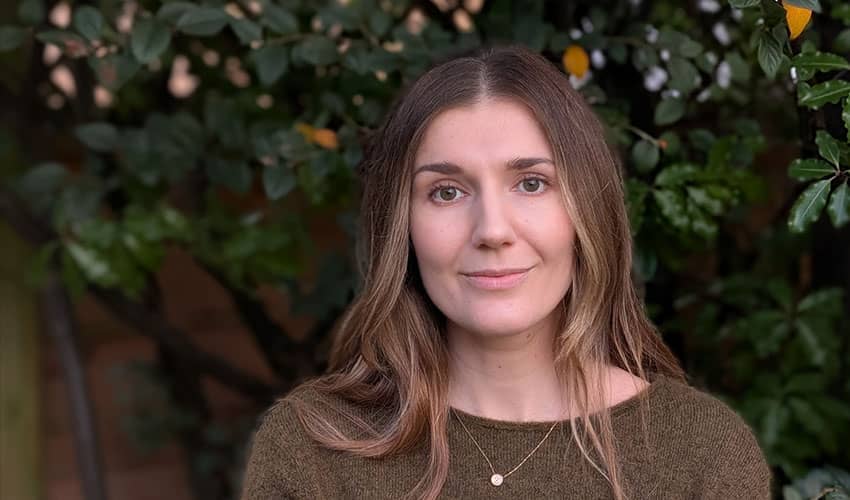Opinion: Christmas… are you ‘totally sleighing it’ or wondering ‘what the elf’?

The festive season is a joyful time for many, but for others it can bring stress and plenty of challenges. If your Christmas isn’t picture-perfect, what can you do to bring a moment of calm and boost your mood?
Let me introduce you to a possible remedy which doesn’t involve dipping into a box of chocolates or pouring a large glass of wine: singing in a group.
Belting out a tune is such an interesting activity. As adults we might feel awkward singing, particularly in company; from the moment we leave primary school, many choose never to flex their vocal cords in public again.
For me, this is heartbreaking because when we sing in a group, there are some very particular responses that happen in the body and in the brain.
When you’re alone it can boost your mood with an endorphin rush, and singing with others brings additional benefits: a sense of connection, togetherness and community.
A dose of wellbeing
Earlier this year, UWE Bristol teamed up with St George’s Bristol for a groundbreaking research project called Sing for Happiness. We set out to explore the effect singing in a group had on people’s mood and wellbeing.
Previous singing and wellbeing research has typically concentrated on smaller, well-established groups of singers. We wanted this project to be open to everyone no matter what their background – from seasoned singers to people with no singing experience, and those who believed they couldn’t hold a tune at all. And we’re grateful for the support of the Good Grief Project, Rising Voices, Age UK, and Hand in Hand, through which we were able to offer subsidised places for those who might be facing financial barriers to taking part.
There was no shortage of people wanting to get involved, with hundreds attending a series of in-person singing sessions at St George’s Bristol, where they learnt and performed several well-known songs across many genres, with more joining remotely online.
We gathered data from 361 participants, including mood surveys completed before and after the sessions and wellbeing questionnaires before and after the whole project, making Sing for Happiness the largest study of its kind.
The findings
- Instant mood boosters: Most people left singing sessions feeling happier, calmer, and more energised.
- Lasting impact: Over three months, generally speaking, participants’ overall wellbeing improved, even for many people with low starting scores or those facing more challenging circumstances.
- Inclusivity: The benefits weren’t limited to those who had experience of singing. Even those who’d never sung as adults – and didn’t think they could – experienced the same lift.
- Music preference wasn’t a barrier either. In fact, for some, like fans of gospel music, the mood improvements were positively soaring.
Singing in the season
This Christmas, we brought Sing for Happiness back with a festive twist; a shortened, two-session programme culminating in a final performance on December 7, at St George’s Bristol. The idea was simple: give people a moment to pause, breathe, and belt out some festive tunes. Once again, we collected mood data before and after each session including the performance for further analysis. The atmosphere during the final performance was both joyful and cathartic, with friends and family in the audience even joining in some of the singing. It will be fascinating to see how participants’ moods were affected by these experiences once data has been coded and analysed.
Looking ahead
Next summer, we’re launching another edition of Sing for Happiness, so there’s plenty of opportunity to get involved in 2025. And we hope to expand the research further, exploring not just mood but physiological changes as well, which might include recording cortisol levels for example.
But for now, if you’ve got the winter blues and you’re feeling the weight of Christmas expectations, why not give singing a try? Pop along to your local carol concert, get some friends and family over for a singalong, or maybe think about joining a choir. You might just find singing together brings you exactly what you need: a moment of calm, a boost of happiness, and a reminder of what this season is really about.
By Kat Branch, university researcher and Head of UWE Bristol’s Centre for Music.
Related news

16 February 2026
UWE Bristol researchers awarded grant to explore impact of asset recovery on offenders
UWE Bristol academics have been awarded funding to explore of the impact of asset recovery on deterring offender behaviour and disrupting crime networks.

10 February 2026
Work by UWE Bristol lecturer features in Government’s National Cancer Plan
Work by a UWE Bristol academic has been included in the Government’s National Cancer Plan.

23 January 2026
On-demand minibus services beneficial in rural areas but face financial challenges, trials suggest
Trials of ‘demand responsive transport’ minibus services boosted connectivity for people in rural and suburban areas, according to a new report produced by UWE Bristol researchers.

18 December 2025
UWE Bristol professor appointed National Institute for Health and Care Excellence CEO
Jonathan Benger CBE, Professor of Emergency Care at UWE Bristol, has been appointed as the new chief executive officer of the National Institute for Health and Care Excellence (NICE).

17 December 2025
Findings revealed from first UK study into experiences of mothers who are survivors of rape pregnancy
UWE Bristol academics have revealed the findings of the first UK-based study of the experiences of mothers who are survivors of rape pregnancy.

11 December 2025
Social media influencer work is far more demanding than it looks, research finds
A study exploring the mental health impacts of social media influencer work has revealed that life online is far more demanding than it appears.

25 November 2025
UWE Bristol experts join film Q&A exploring music and melodrama
Academics will take part in the Cary Comes Home Festival, with a post-screening Q&A exploring music, melodrama and emotional storytelling in classic cinema.

17 November 2025
Urgent reform needed to support ambulance-delivered end of life care, study finds
More than three quarters (78 per cent) of paramedics sometimes fear doing the wrong thing when caring for people in the last year of life, new research has found.

13 November 2025
Bristol’s screen industry experiences “boom-and-bust cycle” after post-pandemic recovery, new research from UWE Bristol finds
New research from UWE Bristol provides detailed insight into Bristol's screen sector.

13 November 2025
New AI research to revolutionise animal welfare
A UWE Bristol research project will combine behavioural science and AI to create technology that understands not only what animals do, but how they feel.

10 November 2025
Lessons from Low Traffic Neighbourhoods will drive better public engagement, study finds
Lessons from Low Traffic Neighbourhoods have informed a new toolkit to improve engagement with the public on challenging local street issues.

06 November 2025
First-of-its-kind study aims to help more people spend their final days at home
A new study will explore how architectural design could support end-of-life care in domestic settings.






